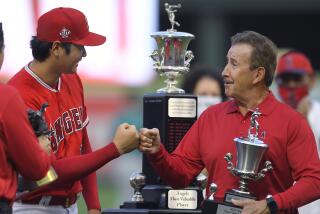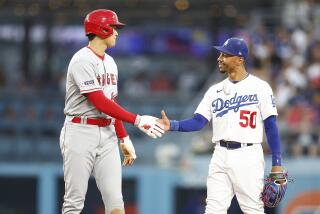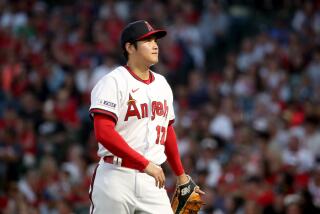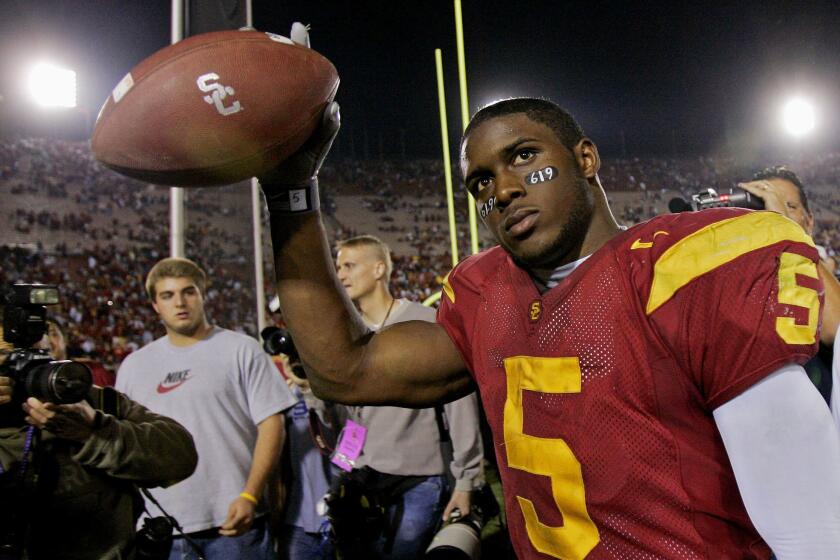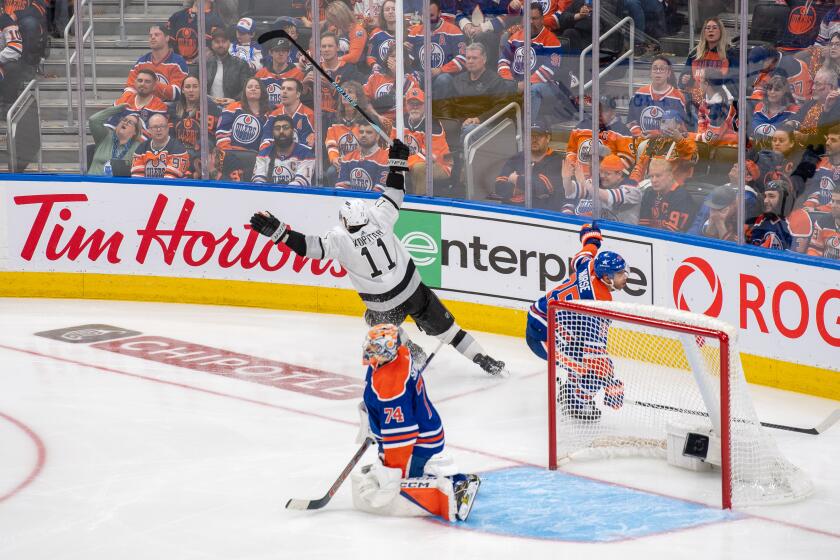Big contracts for older baseball players don’t always pay off
There was an eerie sense of deja vu in the Dallas Hilton Anatole last Thursday morning.
In the same winter meetings hotel in which the Texas Rangers stunned baseball by signing Alex Rodriguez to a 10-year, $252-million deal in 2000, the Angels sent similar shock waves through the game, acquiring slugger Albert Pujols with a 10-year, $254-million deal.
“There must be a strain of Legionnaires’ disease in here,” New York Mets General Manager Sandy Alderson said. “I think every club that has signed a 10-year contract has regretted it.”
Maybe not every club. The New York Yankees did OK with the 10-year, $189-million deal they gave shortstop Derek Jeter in 2001. But most teams that award monster deals to players, especially players over the age of 30, eventually regret it.
Angels owner Arte Moreno understands the risk — and the backlash — associated with long and lucrative contracts.
“They’re going to say this is a dumb move,” Moreno told reporters after Pujols and pitcher C.J. Wilson, who signed a five-year, $77.5-million deal with the Angels, were introduced Saturday. “They’ve been saying that about me my whole career.”
Actually, Moreno has had plenty of dumb luck when it comes to mega-deals.
He offered Alfonso Soriano seven years and $120 million before the outfielder signed an eight-year, $136-million deal with the Chicago Cubs before 2007. Soriano has hit .266 in five years in Chicago, averaging 26 home runs and 73 runs batted in per season, and the Cubs haven’t made it past the first round of the playoffs.
Carl Crawford turned down a six-year, $108-million offer from the Angels to sign a seven-year, $142-million deal with the Boston Red Sox last off-season. Moreno was harshly criticized for being a winter bridesmaid again, but finishing second for Crawford was easier to swallow than the outfielder’s 2011 season: .255, 11 homers, 56 RBIs.
The Angels have had mixed results with high-end free agents.
They signed Mo Vaughn for six years and $80 million before 1999, and the first baseman stumbled into the dugout and sprained an ankle in his first game as an Angel. Vaughn, 31 when he signed, had two decent seasons, tore a biceps tendon in 2001 and was shipped to the Mets in a mutual salary-dump deal for pitcher Kevin Appier before 2002.
Vladimir Guerrero, 29 when he signed a five-year, $70-million deal in 2004, won an American League most-valuable-player award and was the Angels’ top slugger while leading them to five playoff appearances in six years.
Bartolo Colon was 31 when he signed a four-year, $51-million deal in 2004. The right-hander was 21-8 and won the AL Cy Young Award in 2005, but was limited by injuries to 29 games in the final two years of the deal.
The five-year, $50-million deal for 32-year-old Gary Matthews Jr. before 2007 was a disaster; the outfielder was a bust, and the Angels ate the last two years of his contract.
Outfielder Torii Hunter has given the Angels solid production under the five-year, $90-million deal he signed as a 32-year-old before 2008, but not $18-million-a-year’s worth.
The Angels assumed the last four years and $81 million of Vernon Wells’ seven-year, $126-million contract when they acquired him from Toronto last winter. How’s that working out? Wells hit .218 with 25 homers and 66 RBIs last season.
Now comes Pujols.
The three-time National League MVP led St. Louis to World Series championships in 2006 and 2011 and has been the “iconic offensive player of this generation,” as Angels General Manager Jerry Dipoto said.
But Pujols, who is a Gold Glove-caliber first baseman, turns 32 in January and will be 41 when he enters the final year of his contract — with a salary of about $30 million.
The Angels believe they can mitigate the risk of the deal by using Pujols as a designated hitter in the latter half of the contract.
Pujols has averaged 155 games per season in 11 years while avoiding major injury.
“I know with the way I take care of my body and the way I prepare myself to play this game, I feel I can play until I’m 45,” Pujols said Saturday. “Who knows?”
Only one player in the last 35 years has put up consistent MVP-type numbers from age 36 to 41: Barry Bonds, whose career home run record is tainted by suspicions of steroid use.
“Hitters age … but Albert has had an extraordinary career in regard to controlling the strike zone,” Dipoto said. “We’ve had many discussions on how we feel he’ll evolve as a player. Albert is still as big an impact bat after 11 years as there is in the game. And we feel confident that that’s what we’re placing in the Angels’ lineup.”
The Yankees felt the same way about Rodriguez when they signed the third baseman to a 10-year, $275-million extension before 2008. Joel Sherman of the New York Post wrote last week that the Yankees “now concede” the contract was “a mistake.”
Like Pujols, Rodriguez was coming off his age-31 season and had won three MVP awards. In the three previous seasons, he had a 1.005 OPS (on-base plus slugging) and 137 homers in 474 games.
Pujols, 31 in 2011, has a 1.007 OPS with 126 homers in 466 games over his last three seasons.
In four years since signing his contract, Rodriguez has had two surgeries, played 498 games and hit 111 homers with an .896 OPS. With six years and $143 million left on the deal, Rodriguez, 36, is not the feared hitter he once was.
Pujols has been in decline for two seasons. After hitting .327 with 47 homers and 135 RBIs in 2009, he hit .312 with 42 homers and 118 RBIs in 2010 and .299 with 37 homers and 99 RBIs in 2011.
The Angels were not fazed.
“If a decline still places you in the top five in the MVP vote … if we want to call a decline going from super human to just great,” Dipoto said, not finishing the thought. “I don’t think we’ve seen the last great days of Albert Pujols.”
Signing the best player in the game to an astronomical contract does not guarantee success.
Rodriguez put up gaudy numbers in his first three years in Texas, averaging 52 homers and 131 RBIs, but the Rangers finished last in the AL West each season and were 216-270, and home attendance declined.
Hemorrhaging money, Texas had little choice but to trade Rodriguez to the Yankees before 2005, the Rangers picking up $67 million of the remaining $179 million on Rodriguez’s contract.
Five years later, the Rangers filed for bankruptcy — Rodriguez, who was owed $25 million in deferred compensation, was listed as the team’s top unsecured creditor — and owner Tom Hicks was forced to sell the club.
A 17-year extension of the Angels’ television contract with Fox Sports, worth between $2 billion and $2.5 billion starting in 2015, should prevent a Hicks-like scenario in Anaheim.
Though Pujols could put a considerable strain on the payroll if he is not producing in the second half of the contract, Moreno will gladly accept that if Pujols can lead the team to a championship or two in the first half of the deal.
Besides, it’s Moreno’s money. He’ll spend it as he wishes.
“If you have an opportunity, and we believe it’s good for the franchise for the long term, why don’t I make this deal?” Moreno said. “I just think it’s a different kind of player. Maybe in the last 50 years, we haven’t seen a player like this.”
twitter.com/MikeDiGiovanna
More to Read
Get our high school sports newsletter
Prep Rally is devoted to the SoCal high school sports experience, bringing you scores, stories and a behind-the-scenes look at what makes prep sports so popular.
You may occasionally receive promotional content from the Los Angeles Times.
